US government sues to block largest supermarket merger in history
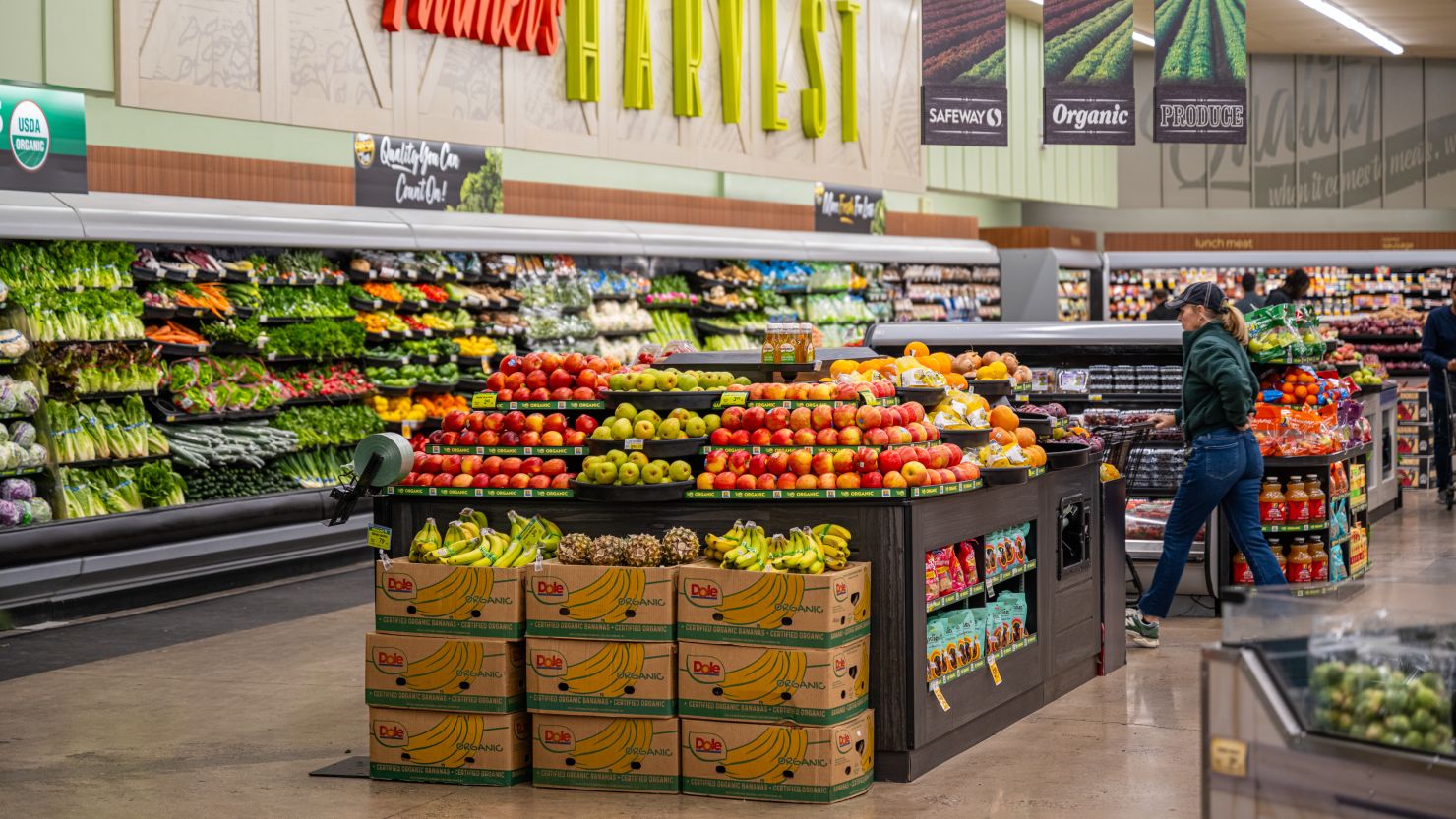 Produce at an Albertsons Cos. brand Safeway grocery store in Scottsdale, Arizona, US, on Wednesday, Jan. 3, 2024. Ash Ponders/Bloomberg/Getty Images
Produce at an Albertsons Cos. brand Safeway grocery store in Scottsdale, Arizona, US, on Wednesday, Jan. 3, 2024. Ash Ponders/Bloomberg/Getty Images
New YorkCNN —
The Federal Trade Commission on Monday sued to block the $25 billion deal between Kroger and Albertsons, alleging the largest supermarket merger in US history would lead to higher prices, store closures and job losses.
The merger, announced in 2022, sought to combine the fifth and tenth largest retailers in the country. The companies own dozens of chains, including Safeway, Vons, Harris Teeter and Fred Meyer.
But the proposed merger came as food prices have skyrocketed. Americans are spending 26% more on groceries since 2020, according to the Bureau of Labor Statistics, and the highest portion of their income on food than any point over the past 30 years.
The FTC, in a statement, said the merger would eliminate competition in the grocery industry, which could drive costs even higher. RELATED ARTICLE
RELATED ARTICLE
Surging restaurant prices are making dining out a luxury
Kroger (KR) and Albertsons, which both employ mostly unionized workforces, said they wanted to merge to be more competitive against non-union giants such as Walmart, Amazon and Costco. The grocers are also facing increased pressure from Aldi, the fast-growing German discount supermarket chain.
The merger would accelerate “our position as a more compelling alternative to larger and non-union competitors,” Kroger CEO Rodney McMullen said when the deal was announced.
The two companies have a combined 710,000 workers, nearly 5,000 stores and more than $200 billion in sales. The companies argued that they will be able to use $500 million in cost savings from the deal to reduce prices for shoppers and tailor promotions and savings.
But the FTC in its lawsuit was skeptical of the claim.
“This supermarket mega merger comes as American consumers have seen the cost of groceries rise steadily over the past few years. Kroger’s acquisition of Albertsons would lead to additional grocery price hikes for everyday goods, said Henry Liu, director of the FTC’s Bureau of Competition.
Unions, small grocers and a coalition of Democrats and Republicans on Capitol Hill, including Democrat Elizabeth Warren of Massachusetts and Republican Mike Lee of Utah, also strongly opposed the merger from the start.
Kroger and Albertsons criticized the FTC’s decision.
Enter your email to subscribe to the CNN Business Newsletter.

 Get essential news and analysis on global markets with CNN Business’ daily newsletter.
Get essential news and analysis on global markets with CNN Business’ daily newsletter.
A Kroger spokesperson said in a statement that the FTC’s move “will actually harm the very people the FTC purports to serve: America’s consumers and workers.”
The FTC’s suit “only strengthens larger, non-unionized retailers like Walmart, Costco and Amazon by allowing them to further increase their overwhelming and growing dominance of the grocery industry,” the spokesperson said.
Kroger said it will appeal the FTC’s decision.
FTC Chair Khan skeptical of divestitures
To address antitrust concerns that the merger would stifle competition in local markets where their stores overlap, Kroger and Albertsons agreed to sell roughly 400 stores to C&S Wholesale Grocers, the owner of Piggly Wiggly and other brands.
C&S has also provisionally agreed to purchase more than 200 additional stores if the proposed deal received regulatory pusback.
But the FTC said the divestiture proposal was a “hodgepodge of unconnected stores, banners, brands, and other assets that Kroger’s antitrust lawyers have cobbled together” and would not be a “successful competitor against a combined Kroger and Albertsons.”
Albertsons’ $9 billion tie-up with Safeway in 2014 loomed over regulators, including FTC chair Lina Khan. RELATED ARTICLE
RELATED ARTICLE
‘Serious concerns’: These senators are pushing back on the $25 billion Kroger-Albertsons merger
To win approval for that deal from antitrust regulators, Albertsons and Safeway agreed to sell 168 of their stores to buyers approved by the FTC.
With the FTC’s blessing, Haggen, a small supermarket chain in the Northwest with just 18 locations, bought 146 of the former Albertsons and Safeway stores.
But Haggen struggled to manage the stores. Less than a year later, Haggen filed for bankruptcy and closed some locations.
Khan has been skeptical of divestitures as an effective tool to promote competition. She criticized the FTC’s handling of Albertsons’ deal with Safeway, pointing to it as a prime example of the limitations of divestitures.
In a 2017 law review article she wrote prior to helming the FTC, Khan said the agency’s approval of the divestiture to Haggen was “[hard] to fathom” and a “spectacular” failure.
“Even a casual observer could have predicted that Haggen would have great difficulty expanding its storefronts,” Khan said. “The skeptics have been proven right.”
Under Khan, the FTC has also launched landmark antitrust suits against Amazon and other tech giants.
Bad blood over Singapore Taylor Swift Eras tour subsidies
 IMAGE SOURCE,
IMAGE SOURCE,
EPA
Image caption,
The Singapore leg of the Eras tour has Swifties flying in from around the region
By Frances Mao
in Singapore
In the glitzy Asian city-state of Singapore, the sequins are out, limousines polished and hotel pillows plumped.
The city's hosting Taylor Swift's Eras tour this week - an honour, but one that has come at a cost.
That price was initially reported to be as high as S$24 million (£14m; $18m) for the six shows to be exclusive to the South East Asian country.
Culture minister Edwin Tong has since told Singapore's CNA the figure was "nowhere as high" - although he still refused to be drawn on the exact figure. The broadcaster, however, suggested it may have been just S$2m for all six.
But the fact any money had been spent only came to light after an outburst from the prime minister of Thailand, who accused Singapore of paying concert organisers US$2-3m per night.
That triggered criticism across the region. In the Philippines, a lawmaker criticised the move, saying "this isn't what good neighbours do" - and called for a formal protest against the grant.
But while governments are seeing red - it's the fans who are paying the price, literally.
Swift is heard everywhere across South East Asia, home to roughly 700 million people - from alleyways in Ho Chi Minh to taxi cabs in Bangkok.
So for many it was a punch in the guts to learn all six shows would be held in the region's most expensive city.
Singapore's currency - one of the strongest in Asia - has long been a deterrent for visitors. But for a chance to see their idol, many of her fans are willing to grin and bear it.
Look what you made me do
Flight-loads of fans have been touching down at Singapore's Changi Airport all week, many coming from China and its territories.
Swift isn't playing in China so Singapore is the next best thing for many.
One woman flying in from Shenzhen told the BBC she and her friend had spent S$1,200 each on tickets alone. They've resorted to camping at a friend's house after hotel rates across the city surged.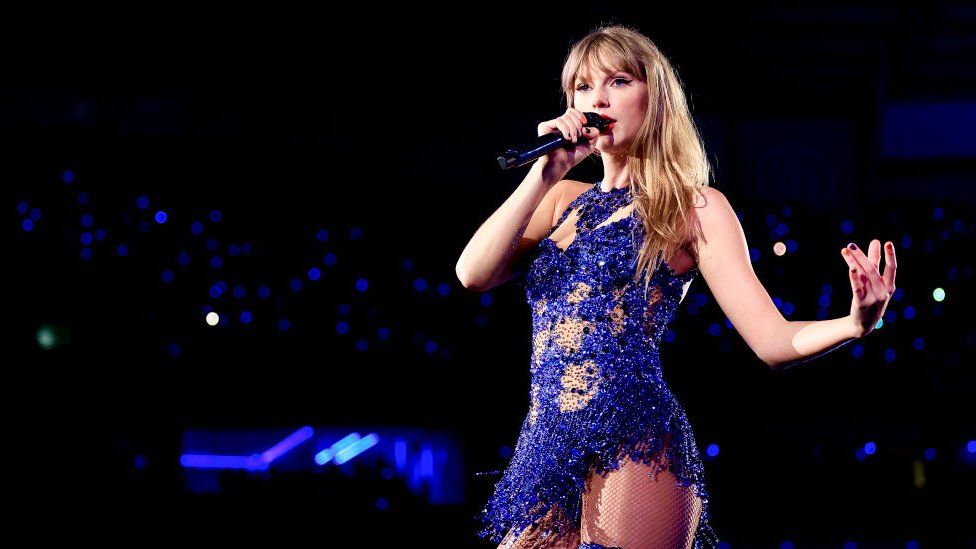 IMAGE SOURCE,
IMAGE SOURCE,
GETTY IMAGES
Image caption,
Taylor Swift in Sao Paulo
On the luxe end of things, the city's landmark hotel Marina Bay Sands has sold out of its S$50,000 Swift packages which included four VIP tickets and a three-night stay in a suite.
Then there's 22-year-old Allen Dungca in the Philippines, who scraped together his wages to take him and his mother to Singapore.
This Thursday, they'll take a four-hour bus ride to Manila, stay at an airport motel for the night, then grab their dawn flight the next day.
The enterprising student snapped up the travel package back in July. He eventually tracked down the tickets on a resale night, after weeks of desperate hunting.
"I am very lucky," he says of the S$400 outlay for seats in the nosebleed section. "The seller was kind and not a scalper."
Resales now are going for thousands. And he had almost fallen for a scam, a shady character named Pat Steve, later exposed online.
He estimates the whole endeavour is costing him S$2,000 - the monthly income of an upper-middle class family in the Philippines, a country where a fifth of the population lives under the poverty line.
"Right now, I'm a student with a part-time job and I can afford my wants and needs. But it's sad, other Swifties don't have any means or budget to watch her overseas and I know most Filipino Swifties love her so much."
The Philippines arguably has the most ardent Swift fan base - Spotify data showed Quezon City in Manila had played the most streams of the singer last year.
The pop star has toured in the Philippines before - but the bag of money from Singapore undoubtedly sweetened the deal, say analysts.
Clean, modern Singapore has long been seen as a base in the region for big events. It has the infrastructure, the transport links and a high-earning, expat-heavy population.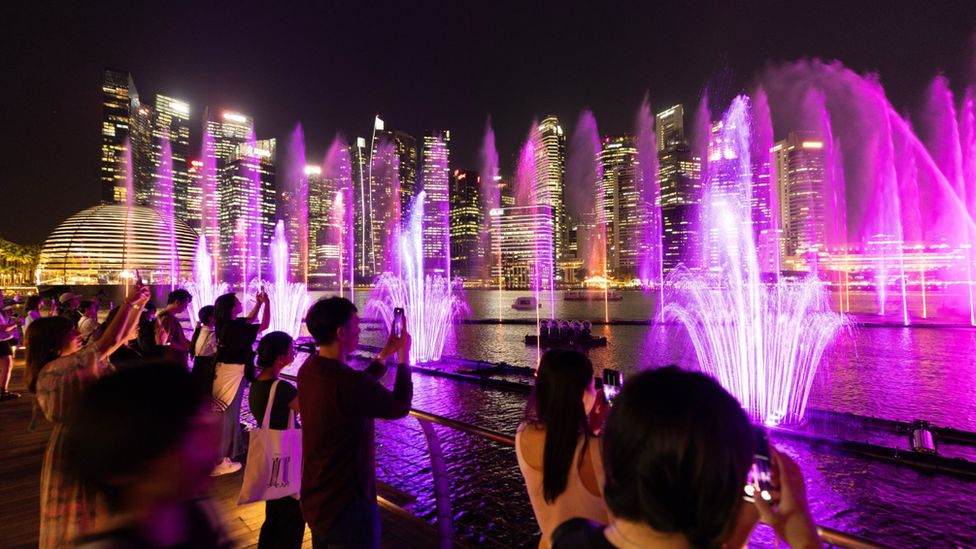 IMAGE SOURCE,
IMAGE SOURCE,
EPA
Image caption,
Swift-themed water and light shows on the bay are among the city's Swiftie attractions this week
It's also seen as reliably stable in a region which has experienced political chaos. A decade ago Swift cancelled her shows in Thailand because of the military coup and resulting protests.
Still, while it's common for governments around the world to give out subsidies and tax breaks to bring in events, the reported spend goes beyond anything else publicly known in Singapore.
Samer Hajjar, a marketing lecturer at the National University of Singapore, says it's "above average" even for the city-state.
And fans are quite blunt. "It's kinda greedy," says Mr Dunga. "But it's wise… because their economic response will be way more than that."
But will it be though?
Show me the money
In Australia, the leg of the tour preceding Singapore, officials suggested the tour had provided a A$145m "uplift" in consumer spending. More than 570,000 tickets were sold across seven nights in Sydney and Melbourne, nearly double the number sold for Singapore's six shows.
But not all of that money counts, says economists.
More than 90% of show-goers were probably local, estimates KPMG's chief economist Dr Brendan Rynne, so their dollars would be "just a transfer from one category of spending (or saving) to another".
Only foreign visitors would have been adding to the books - and they accounted for just 2% of visitors, he estimated. After doing the maths he projected Swift had added only A$10m (£5.1m; $6.5m) to GDP.
Still, Australia didn't use public funds to have Swift play in the country, state government officials confirmed to the BBC. Neither did Japan, the only other Asian stop on the tour.
Singapore has said Swift's tour will bring certain economic benefits to the country.
But just how much net gain will be generated is unclear. The BBC has reached out to Singapore's tourism board but they have refused to reveal foreign visitor estimates or other modelling.
A local bank, Maybank, has suggested that consumer spending may top S$350m - but that's based on the very optimistic prediction of 70% of attendees being from out of town.
Even Singapore's Formula One Grand Prix only saw 49% of spectators from overseas in 2022, with a record 300,000 crowd.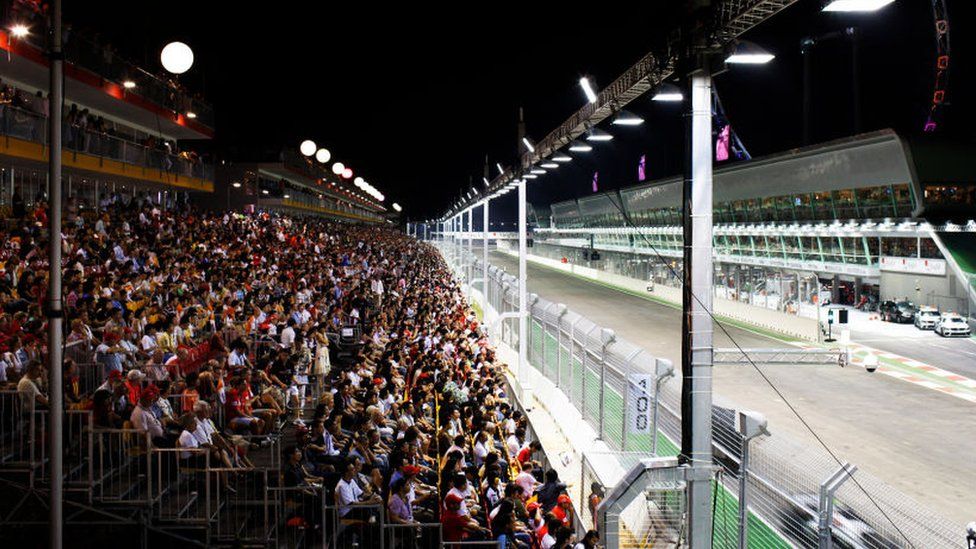 IMAGE SOURCE,
IMAGE SOURCE,
GETTY IMAGES
Image caption,
Singapore's F1 Grand Prix brings thousands of overseas visitors each year
When pressed on the numbers, Maybank's economist Erica Tay could not provide specifics, saying the 70% rate was based on Singapore's "potential catchment" and the bank was not interested in estimating net profit.
"Six concerts may not move a nation's economic growth materially, but the strategic value of Taylor Swift's endorsement of Singapore as a tourism destination outweighs that one-off boost," she said.
But business professor Julien Cayla from Singapore's Nanyang Technological University points out that public spend should be scrutinised - especially when it's only revealed to citizens by another country's government.
And in a country where welfare benefits are relatively limited - it could be seen as a fraught spend.
"To justify spending [reportedly] S$24 million on something that on the surface might not seem that critical to the economic health of the country over spending on people and public services… there's a tension there," Prof Cayla said.
Nonetheless he and others say that when it comes to planning tourism, governments have mandate to throw around money and Singapore isn't an exception.
"They don't necessarily like to advertise it. But the minute the government sees something that fits into a long-term strategy, it will sink government money in to support that," he says.
In a way, Singapore has just brought in Swift the same way it currently attracts huge multinational corporations.
"What's different here is that Taylor Swift as a business, is a very emotional business," he said.
"It's dealing with the emotions of 10-18 year olds, who are very sad to not see the concert happening in Bangkok or Jakarta."
And in the words of the songstress herself, that's caused a lot of bad blood.
Related Topics
Taylor Swift: Inside a world-first 'Swiftposium' academic summit
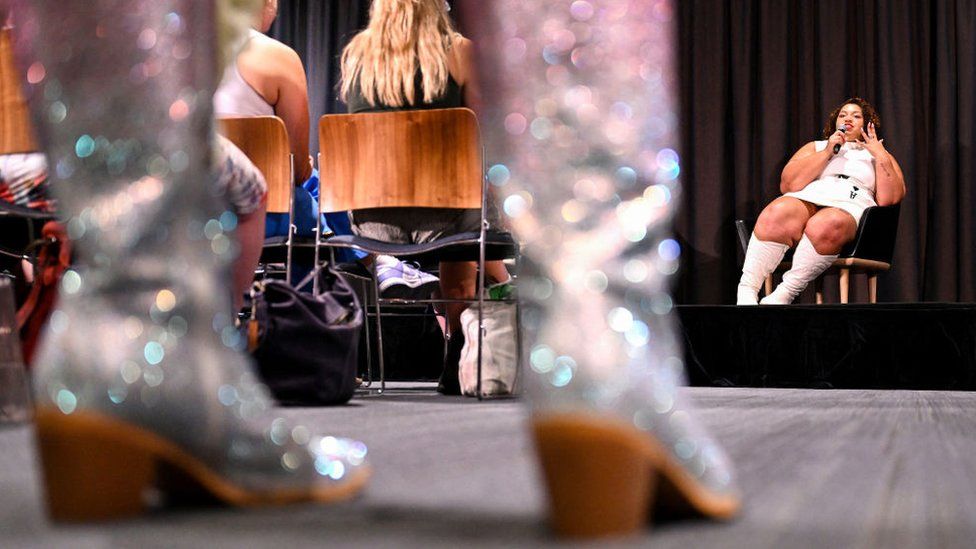 I
I
Scores of sequinned scholars are exploring Taylor Swift's impact at an academic conference
By Tiffanie Turnbull
in Melbourne
From the moment she slipped the Fearless record into her CD player as a 14-year-old, Georgia Carroll has been fascinated by Taylor Swift.
A decade and a half on, she's now touted as the only person in the world with a PhD on the superstar.
Her assessment? "At the moment, it wouldn't be going too far to say [Swift] is one of the most powerful people in the world."
That's why Dr Carroll is among scores of experts who have descended on Melbourne this week for an international academic symposium attempting to explain just how Swift has become so influential.
The event - the first of its kind - is a curtain raiser to the Eras Tour in Australia, and has attracted more than 400 submissions from dozens of study disciplines and academic institutions around the world - sparking a flurry of excitement and global headlines.
'Started as a joke'
The idea for the 'Swiftposium' was born last July as a half-joking tweet with just a few dozen likes. But when organisers quietly announced the event months later it went internationally viral overnight.
Organisers woke up to coverage on the BBC, in Rolling Stone Magazine, CNN.
"I was like, I've got to email my boss," Dr Eloise Faichney says with a grin. "Our little conference suddenly became this juggernaut."
Fans were also desperate to take part, and on Sunday, hundreds of people - walking advertisements for rhinestones, cowboy boots and Swift's signature red lip - flocked into Melbourne's iconic Capitol Theatre just to hear lectures about the megastar.
At a sold-out friendship bracelet-making workshop beforehand, 19-year-old Soumil says the event - run by RMIT University - is helping heal the wounds left by the ticketing bloodbath of last year.
"It's fun to still be part of it all," he tells the BBC.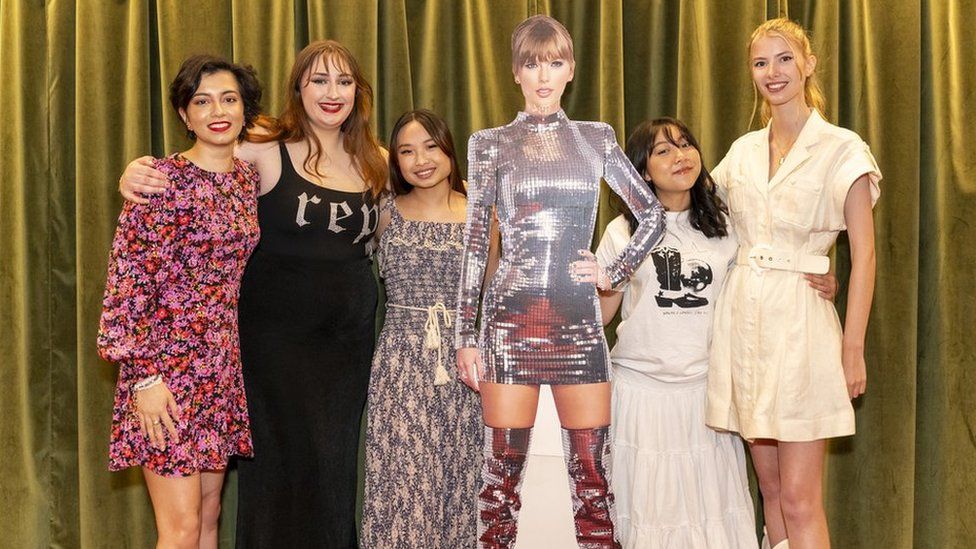 IMAGE SOURCE,
IMAGE SOURCE,
RMIT UNIVERSITY/T J GARVIE
Image caption,
Tickets to fan events were snapped up at lightning speed
But the organisers are quick to clarify the conference - backed by seven universities across Australia and New Zealand - is not a fan convention.
"Although some of us are fans, it certainly - for us - is about trying to take somebody like her seriously in academia," Dr Emma Whatman says.
"This is not an uncritical celebration."
'Godlike' influence
There's no denying 'Taylor Mania' has swept the world this past year - she was named Time Magazine's Person of the Year in 2023 - and it's unclear when that might fade.
On Monday, the 34-year-old again dominated the headlines with pictures of her and footballer boyfriend Travis Kelce winning at the Super Bowl. Last week she cleaned up at the Grammys, taking home her fourth album of the year accolade.
Even her cats, her publicist and her childhood friends have name recognition and a loyal following.
"[Swift] has somehow become the most godlike superstar on the planet, bigger than I thought was even possible," keynote speaker Brittany Spanos - a Rolling Stone reporter who in 2020 taught the first ever university course on the idol - told the conference.
But Swift has long found herself at the centre of huge cultural moments and debates, ever since shooting to stardom as a teenager.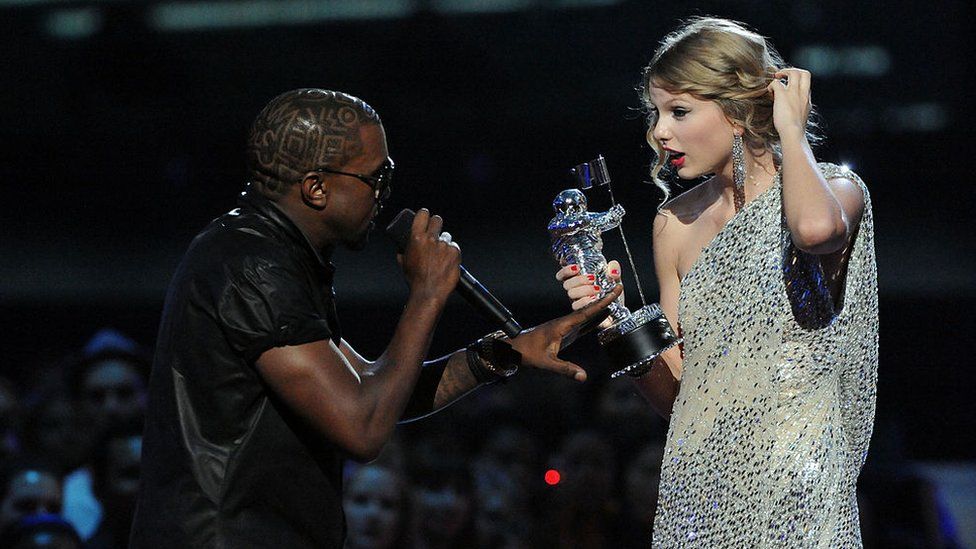
Her infamous run in with Kanye West in 2009 was one of those moments
She has become one of the highest-earning and most-celebrated artists of all time - all while igniting conversations about everything from streaming royalties and music ownership to misogyny and cancel culture.
The summit obviously has a whole panel dedicated to "Swiftonomics" - a trend coined to explain her mammoth effect on economies, and one which has left world leaders begging her to tour their countries.
But there are also experts detailing how her bops are being used to train young people in CPR and excited discussion about the way her romance with Kelce is helping girls feel at home in traditionally male-dominated sports fandoms.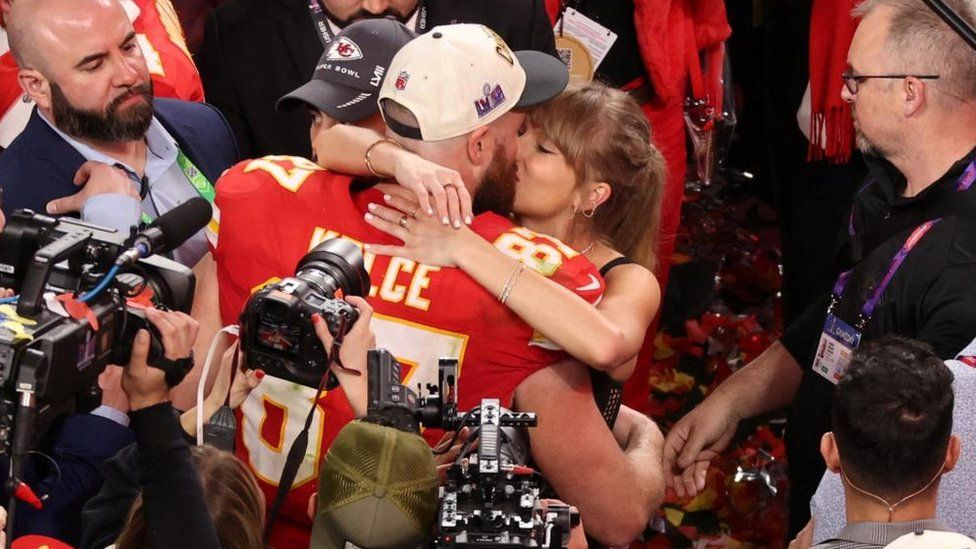 Swift's attention has resulted in a massive increase in NFL revenue too
Swift's attention has resulted in a massive increase in NFL revenue too
There's even a lyrical analysis of her attitudes towards public transport (ironically, as her real-life private jet use has increased, so have songs referencing trains and buses, Harrison Croft says).
And when the audience tired of listening to speeches, they were treated to a duet between a musician-turned-academic and an uncomfortably accurate AI clone of a younger Swift's voice - to contrast how her sound has changed over the past 17 years.
For the literature fans, the conference had a mother-daughter duo read spoken-word poetry about the contempt society shows for the interests of young women - an item which drew an adoring reaction from the crowd. And for the politics nerds, an academic presenting on how Australian MPs use Swift to seem relatable.
Madeline Pentland, 27, found more than 30 speeches citing her most iconic lyrics - including a shameless performance by the treasurer of New South Wales, who racked up 20 references in a single speech.
Men were more likely to quote the singer, she discovered, but they tended to use the lyrics in political attack or mockery, whereas women were far more likely to use them to support topics of debate.
But Ms Pentland was most amused to find them wielded during one of Australian politics' favourite past times - the disposing of leaders.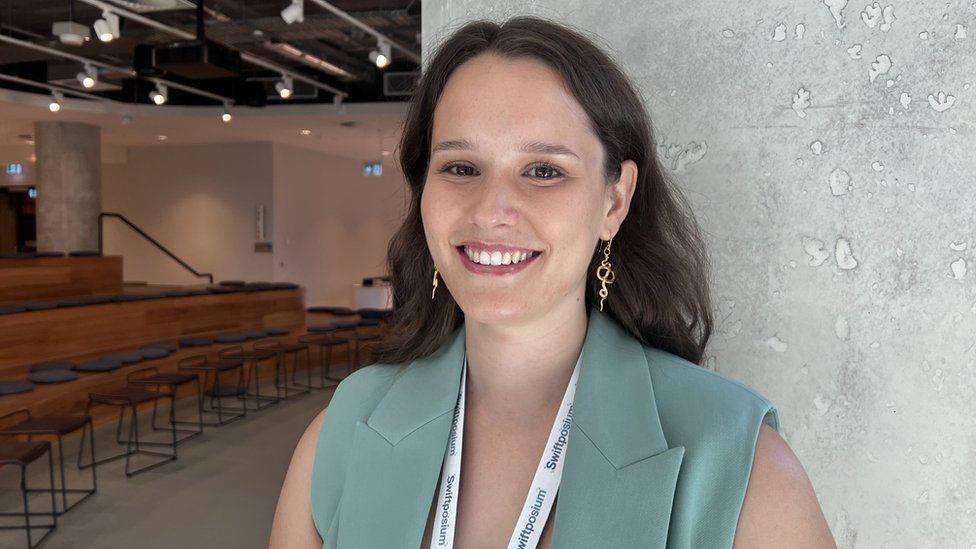 Image caption,
Image caption,
Swift's popularity amongst politicians surprised historian Madeline Pentland
She laments, though, what she thinks are some missed opportunities: "I would have thought that there would be a bit of Bad Blood here and there, but I didn't find any references!"
Another duo has explored how Swift has become such a magnet for conspiracy - from "delulu" fans reading into her strategic hints to right-wing characters reading into almost anything.
In the past few days alone, US President Joe Biden has joked off conjecture that Swift's love life is part of a plot to rig the Super Bowl and help get him get re-elected, while her fans were convincing anyone with an internet connection that the re-record of the Reputation album was imminent.
Clare Southerton is interested in what all that can teach us about growing conspiracy communities.
"There's a world of difference between being like, 'Oh, look, the blue dress means 1989 is next'… and being a domestic terrorist, but it's helpful for us to understand, why do people enjoy this?" the 35-year-old told the BBC.
There have also been uncomfortable debates about how terrifyingly unforgiving Swift's fanbase can be, how her music reflects colonialism, and her controversial casting as a transport-emissions villain.
Singaporean academic Aimee-Sophia Lim - who studies how the artist is inspiring political activism in South East Asia - says she's a huge fan, but she is often disappointed by Swift's "US-centric, white brand of feminism".
"Perhaps people of colour and those from the Global South should be the ones advocating for themselves and their communities… but Taylor's outreach is undeniable," the 23-year-old tells the BBC from Singapore.
"It would be great if she manages to expand her activism, so perhaps she could give a platform to other people who are able to speak on behalf of themselves."
How did she become so powerful?
Not everyone is buying into the hype though.
Sabrina - who is literally fleeing the city the weekend the Eras Tour comes to town - says she can't comprehend the insane levels of Swift's appeal or influence.
"I don't understand the whole fuss… like, I really don't understand what's happening here," she tells the BBC.
But Dr Carroll says it comes down to the broadly relatable brand Swift has built, and the "intense connection" she's managed to cultivate with her base - many of whom feel like they've grown up with her.
"Taylor has spent her whole career making her fans think they could be her friend," she tells the BBC.
"And she's done all of these things that make fans want to act in a way that makes her like them back," adding that can at times lead to concerning behaviour - like mobbing her friend's wedding, spending tens of thousands on merch and tickets, and obsessing over her every move.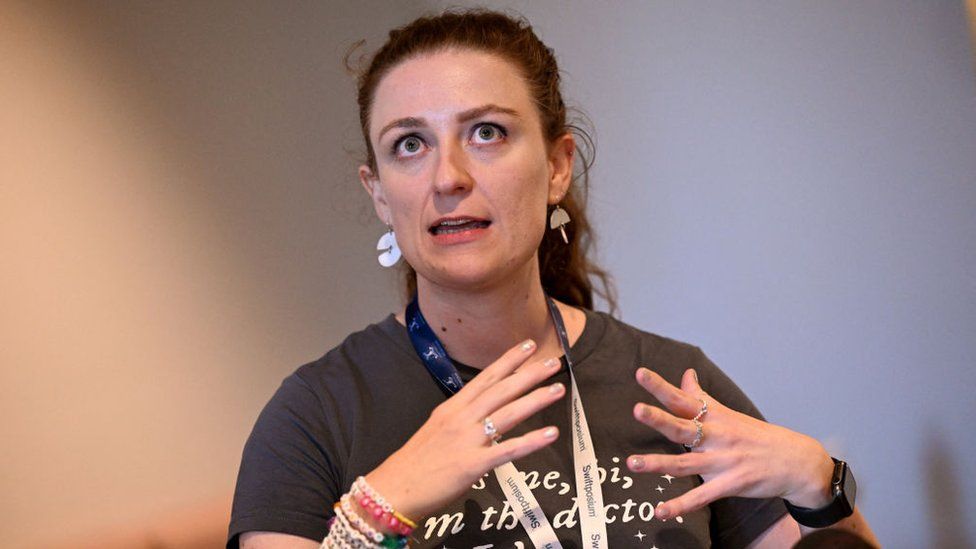
Dr Carroll knows Swift's power first hand
All throughout the symposium - hosted by the University of Melbourne - people have been likening Swift to Elvis, Michael Jackson, Madonna and Beyoncé.
It's hard to compare her to those artists of a different era, keynote speaker Ms Spanos tells the BBC, but she's certainly the hottest thing on the planet right now.
"She'll be considered the greatest songwriter of her generation… and also one of the greatest songwriters of all time."
Dr Carroll argues Swift has indeed been able to take her fame to another level though - thanks to that broad, incredibly motivated fanbase.
"[For other artists], their sphere of influence doesn't extend too far out of their fan base. But that's no longer true of Taylor."
And it's nice - and long overdue - that people are taking an interest in that, she says.
A year ago, when receiving her doctorate people laughed at the topic of her studies. Now she's giving a keynote speech at one of the most publicised academic conferences in the world.
"It's kind of like, oh my God, everybody gets it!" she says. "It's that feeling of being seen, and recognition that my research does have a value.
"We are not just gonna be sitting around at this conference fangirling - that will occur - but there's so much that studying her can tell us about the world."







































